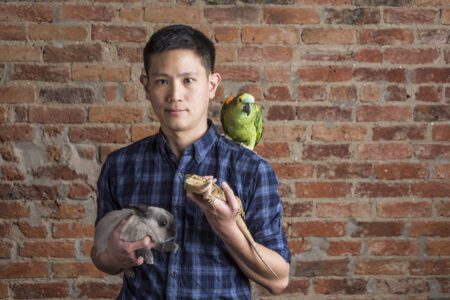
Some jobs are a walk in the park, and other jobs feel like an entire parkour course that drains you mentally, physically, and emotionally.
Careers in veterinary medicine and surgery belong to that challenging category.
“Not only is the turnover in the veterinary medicine and surgery industry high worldwide, there’s an extremely high suicide rate,” says Hing Tong Lee, a Bachelor in Veterinary Medicine and Surgery student at the University of Edinburgh.
Despite knowing this, Lee is determined to push on.
“It’s the compassion and passion that’s making me stay,” she says. “I’m in my final year rotation and love what I’m learning. It’s keeping my brain active, and I enjoy having medical discussions with other clinicians. This is what I want, and I want to provide care for animals.”
But that doesn’t mean her journey is any easier.

Lee surrounded by the lambs newly born during her lambing placement. Source: Hing Tong Lee
The tough business of veterinary medicine
Perhaps the biggest struggle of being a vet is having pet owners get mad at you for not treating their animals for free. Even Shangzhe Xie, the Vice President of Veterinary Healthcare at Mandai Wildlife Reserve, a unique wildlife and nature destination in Singapore home to world-renowned wildlife parks, says the same thing.
Lee acknowledges this too.
“There is a misconception that vets are money grabbers,” says Lee. “They think we’re doing different procedures just because we want their money. I promise you, it’s not the case.”
One of the main costs of procedures at veterinary clinics go toward the drugs used on animals, and there’s a reason for this.
For veterinary medicine to be licensed, trials must be conducted to ensure its safety, quality, and effectiveness. It can take two to four years for the medicine to be licensed and an investment of US$5 to US$10 million — a costly process for a risky venture.
In addition, vets in the UK have to follow “the cascade” — a risk-based decision tree — when deciding what medication to prescribe for their patients.
Hence, pet owners often have to pay a hefty amount for their pets’ medications.
Ultimately, a considerable amount of careful thought and planning goes into diagnosing and prescribing medicine — something that not everyone is truly aware of.
On top of all that, being a vet comes with a handful of other challenges.
Several veterinarian graduates in the US face significant student loan debt, averaging US$179,505, according to SoFi Learn. Worse yet, US veterinarians saw a slight decline in their incomes in 2022, going from US$147,787 in 2021 to US$146,782, according to the American Veterinary Medical Association (AVMA).
Add that to the fact that the worldwide shortage of vets means you’ll be working long and unpredictable hours spurred by emergency cases.
And, of course, there’s the high levels of emotional stress from dealing with the illness and death of the animals.
Euthanasia, in particular, is one of the driving forces for suicides among veterinarians. They often have to make a difficult decision to end an animal’s life, and exposure to this, alongside watching an animal suffer in pain, will affect the veterinarian’s mental health over time.
Lee’s familiar with this.
“It’s definitely an emotion that’s very difficult to describe – it’s very personal, and it’s an incredibly difficult decision and a distressing moment,” she says. “I do still tear up in front of owners, and that’s because I feel very strongly for them. Euthanasia is never easy, and it will never be for me. But slowly and surely, I’m building that resilience and hoping to be that dependable veterinarian that owners can go to.”
Thanks to her family, friends, and boyfriend, Lee has an extremely strong and good support system around her, offering her a safe space to speak up when she’s feeling upset and allowing her to push forward with her passion for animals.

Lee and her coursemates at the University of Edinburgh. Source: Hing Tong Lee
The specialities within veterinary medicine, and what you can do with them
Lee’s love for animals can be traced back to her childhood in Malaysia.
“My dad made sure that I was not afraid of animals,” she shares. “I had two dogs and a big aviary in my backyard. I also had chickens and turtles.”
However, the thought of pursuing a degree in veterinary medicine and surgery didn’t occur to her until she was doing her A Levels.
Funnily enough, Lee’s plans then involved pursuing a career as an interior designer — a path nowhere near to what she is doing now.
In a turn of events, though, Lee chose biology, chemistry, and physics for her A Levels, allowing her to continue with a degree in veterinary medicine and surgery later on.

A calf that Lee cared for by her footwell. Source: Hing Tong Lee
Lee was accepted to her dream university, the Royal Veterinary College, the world’s number-one university in veterinary science, according to the QS World University Rankings.
However, she rejected the offer.
Instead, she was accepted into the University of Edinburgh, which ranked ninth in the QS World University Rankings for veterinary medicine and surgery.
“A lot of consideration was put into my decision, especially the programme, the university, and the campus environment,” she shares. “I chose the University of Edinburgh because of its well-rounded courses and the city’s beauty. It felt like Edinburgh was a city that better suited my lifestyle.”
There, Lee is working towards completing her degree in veterinary medicine and surgery with particular interest on animal dentistry.
“Animal dentistry is a fascinating field; even my friends in other medical fields think it is too,” she says. “My interest in it stems from the importance of dental health in animals.”
According to the American Veterinary Medicine Association, dental health is a very important part of your pet’s overall health as dental problems can cause or be caused by other health problems.
For dog owners, if you neglect your pet’s dental health, they’ll be at risk for developing gingivitis, periodontal disease, bad breath, and, in severe cases, pain, tooth decay, and tooth loss.
Tooth decay is already painful for humans, so imagine what animals would feel if they had it, too — they can’t just tell you about the pain they’re feeling like a human could.
“Many owners don’t realise how important dental health is for their pets and sometimes overlook it,” says Lee. “There are also times when dogs like biting on stones or rocks, which can ultimately fracture their teeth, but owners wouldn’t know.”
That’s where vets like Lee come in.
“A part of being a vet is that we’re educators,” she says. “We help pet owners understand why dental health is essential for pets, as well as the importance of preventive care.”

A photo taken by Lee — “Waking up to a very foggy Northumberland when I was out on placement.” Source: Hing Tong Lee
Why pursue a degree in veterinary medicine abroad
Studying abroad for Lee isn’t only about cultural exchange or educational purposes; it’s about being in an environment that will allow her to grow and gain experiences she can’t get back home.
“I’m not downplaying Malaysia, but there’s a limitation regarding vet schools and veterinary education in the country,” says Lee.
“I was also afraid to pursue my degree in Malaysia because of how competitive the scene is. Hence, I decided to study abroad, and I was privileged enough to be given the opportunity to do so.”
Malaysia’s Universiti Putra Malaysia (UPM) is the only university found on the QS World University Rankings by Subject for veterinary science, ranking at #37.
Comparatively, the UK has six schools listed within the top 30 — proof of the country’s expertise in the subject and better access to top-notch veterinary equipment and experienced veteran professionals.
While rankings may be important to many, at the end of the day, it’s how you perform during and after your degree. Vets are good everywhere, regardless of which university they graduated from.
“It’s a tough degree, and everyone pursuing a veterinary medicine and science degree is incredibly intelligent,” says Lee. “There’s a lot I can learn from vets in Malaysia, and there are things that I can provide from my education in the UK.”
“Besides, much of my experience and interest in the field stem from working in a practice back home. They’ve taught me a lot and I still use some of the techniques I have learned today.”
Wherever you choose to pursue veterinary medicine, however, she advises gaining as much experience in the field as you can before you start your studies.
“Before you apply for vet school, you should volunteer at vet practices, especially a busy one,” shares Lee. “Many vet schools – like the Royal Veterinary College – require you to have hours of work experience in the field as an entry requirement/”
Plus, it helps your application look good too – a clear signal to schools that you’re truly interested in the field.
“You’ll also get a good sense of whether you want to pursue the degree — because it’s all rainbows and butterflies until you’re working in a really busy clinic.”










